After extending the public outreach phase for their Lloyd to Woodlawn Neighborhood Greenway project last month, the Portland Bureau of Transportation says more listening is necessary to learn, “if and how the project can work for the Black community.”
As we reported in September, the project was called out in an article in The Skanner newspaper that reported outreach was, “slow to reach households of color.”
This project aims to create a low-stress, family-friendly bikeway that connects I-84 in the Lloyd to the north Portland neighborhood of Woodlawn. PBOT has shared two basic options — either using 7th or 9th avenue as the north-south route. Since the designs were first unveiled in July, a large majority of strong and enthusiastic support has emerged for the 7th Avenue alignment.
So far, all of PBOT outreach has shown that the NE 7th Avenue alignment is the overwhelming favorite. But that’s only if you measure by quantity of respondents. And as we’ve experienced in the past, it’s not just how many people speak up, it’s who speaks up.
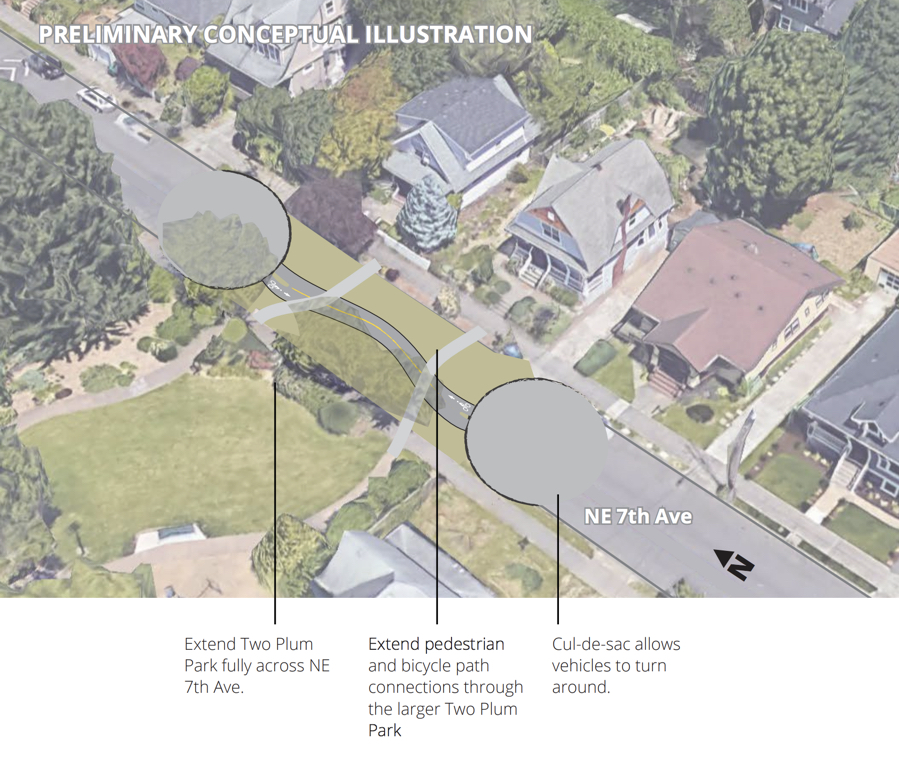
The project includes major changes to 7th Avenue — including the expansion of a park that would create a cul-de-sac for drivers.
PBOT’s latest stance on this project was explained in a letter from Senior Transportation Planner Nick Falbo that was published with a summary report of project feedback. This issue deserves clarity, so instead of explaining or paraphrasing PBOT’s letter, I’ve decided to share all of it below:
In July 2018, PBOT introduced two design concepts for a new neighborhood greenway street in Northeast Portland connecting the Lloyd and Woodlawn neighborhoods with route options primarily on either NE 7th Ave or NE 9th Ave. From July to September 2018, PBOT conducted outreach in the community to help make an informed and community-supported decision about where and how to build the new neighborhood greenway. After engaging with dozens of businesses and community organizations and hundreds of community members, the PBOT project team prepared the attached summary report to capture the themes, preferences and concerns raised about the project proposals to date.
The data misses what some community members – specifically the Black community – have told us about their concerns for this project.
At the August 1st Open House event, project staff heard from many Black community members who expressed strong concerns about the NE 7th Ave route option and raised larger concerns about how the benefits and burdens of the proposal for a new neighborhood greenway are distributed across Portlanders based on race, income and geography. There was high attendance of Black Portlanders that lived in the neighborhood and/or frequented neighborhood destinations (including schools, churches, social services and family homes) regularly. They engaged project staff to understand project goals and proposals and to express concerns about the NE 7th Ave route option. Many expressed that the street provided connectivity and accessibility and that prioritization of 7th for a neighborhood greenway would impact their travel patterns, but would not increase their travel options – which is also a central goal of the project. PBOT staff also heard concerns about how Black families have been burdened by transportation and other City investments for the “greater good” and that there was little confidence that their input could actually influence the future of this and other transportation projects.
The dialogue that occurred between and amongst PBOT staff and Black/ African American Portlanders was powerful, significant and has generated internal discussions about the City’s outreach strategies and planning processes. This moment has led to increased efforts to better understand the unique perspectives and priorities of Black Portlanders with connections to the Historic Albina community. Participants shared frustration about how information about the project had been previously disseminated and expressed concerns about the direction the project seemed to be going. Many community members view NE 7th Avenue as an arterial street for driving and as a crucial way to get around in a community they feel is less and less theirs; we heard concerns that making transformative changes to NE 7th Avenue will continue the decades-long trend of the City making changes for groups other than their own. Community members expressed the fear these changes could contribute to continued displacement of long-time community members from Northeast Portland.
We felt it was important to elevate this information because when the feedback from the in-person forum is combined with the responses from the Online Open House, some of the potency of messages we heard from this population can become diminished in this summarized format. While the summary report accurately describes the combined content heard in both in-person and online outreach efforts, we want to make it clear that the lessons learned at the in-person open house and the urgent need to better understand the perspectives of Black Portlanders will not be overlooked.
In response to these comments, PBOT extended the feedback period for the project design concepts from mid-August until the end of September 2018 to invite more participation. Since then, PBOT has broadened its engagement approach for this and other projects in North and Northeast Portland; PBOT has initiated a number of conversations and focus groups with Black/African American community members and organizations in the project area around what they feel the important transportation issues are in their communities. The intent of this expanded phase of engagement is to understand if and how the Lloyd to Woodlawn Neighborhood Greenway project can work for the Black community. No final decision will be made about the project route and design until after continued engagement with Black community members and organizations has occurred.
PBOT is making this decision in the context of neighborhoods that are the center of Portland’s black community (and historically even more so). Today 14 to 22 percent of the residents in the project corridor identify as black. Compare that to the percentage of respondents to PBOT’s online open house for this project. Of those 253 people, just four percent were black and 81 percent were white.
Five of the six letters PBOT included in their summary of comments publication voiced strong support for the 7th Avenue alignment. Those organizations include: Sabin Community Association, Northeast Coalition of Neighborhoods, the Eliot Neighborhood Association, and the Lloyd Community Association. PBOT’s own Bicycle Advisory Committee stated in an August 14th letter PBAC letter that, “The 7th Avenue Greenway alignment outperforms 9th Avenue in every measure that correlates to successful greenway design: safety, simplicity, intuitiveness, and cost efficiency.”
The one letter that opposed 7th Avenue came from the Soul District Business Association (formerly known as the Alberta Business Association). In their letter dated August 6th, Chair John Washington wrote, “We are concerned about the sincerity of PBOT to listen to our opposition to using NE 7th Avenue as a Greenway. We feel that the impact on our community of using 7th Avenue as a Greenway would perpetuate the negative effects of institutionalized racism and social engineering that has occurred in our African American neighborhoods and business community.”
Washington said they would rather see the greenway on 9th Avenue in part because, “We are deeply concerned that dramatically changing the NE 7th Avenue street pattern will continue the “whitewash” of the neighborhood resulting in more gentrification, as exemplified with the radical changes on Interstate Blvd., North Williams, and North Vancouver Avenues,” and that 9th will have, “Less impact to the street pattern, street use and street historical context, thus less gentrification.”
These concerns about how the project might change the neighborhood were echoed in comments left by some attendees of the open house and respondents to the online survey:
“I’ve spent my whole life in Woodlawn and every time y’all come in and change something it 1. raises the prices and forces my longstanding neighbors, friends, and family out and 2. makes the area more and more welcoming to the area’s new residents at the direct cost of the longstanding community. Please leave Woodlawn alone until you learn how to work with longstanding community members to address the actual set of problems we face. As things stand now, your projects are a barrage of neocolonial ‘development’ that — regardless of rhetoric or intent — pushes us out and destroys our community.”
“Again, getting into what, through my lifetime, has been a rich and white neighborhood and that is who these projects cater to and who they make comfortable so I’m sure they’ll love this minus a few NIMBYs who would be against you doing just about anything. NOTE: Prior to this if you were thinking this was from a NIMBY pov you would be wrong — I’m all for development that is wanted by the longstanding community that addresses historical inequalities and fixes or helps with structural problems that we face. What I don’t like is a bunch of neocolonial projects that, by design, destroy my community and our comfort in our home.”
“I want PBOT to prioritize and elevate feedback from the African American community on this decision. This community has been impacted by neighborhood improvements that have caused significant gentrification and displacement. I think that should be considered as a major factor in how feedback from different communities is weighed for the final design. I understand that there are significant concerns about the 7th Ave. option negatively impacting parents, caregivers and operations of the Albina Head Start program – these should be listened to and weighted in any greenway design decision.”
Projects that improve bicycling are no stranger to conversations about racism. How these concerns impact this specific greenway proposal remain to be seen. PBOT spokesperson Dylan Rivera said today that, “We are fully expecting to deliver a safety improvement project in this corridor.”
If you want to understand more about this topic, Dr. Adonia Lugo — author of Bicycle / Race — will be in Portland for a reading and discussion this Thursday (11/1).
— Jonathan Maus: (503) 706-8804, @jonathan_maus on Twitter and jonathan@bikeportland.org
Never miss a story. Sign-up for the daily BP Headlines email.
BikePortland needs your support.
The post PBOT expands ‘engagement with black community’ to hear concerns around greenway project appeared first on BikePortland.org.
from BikePortland.org https://ift.tt/2AAj4yv
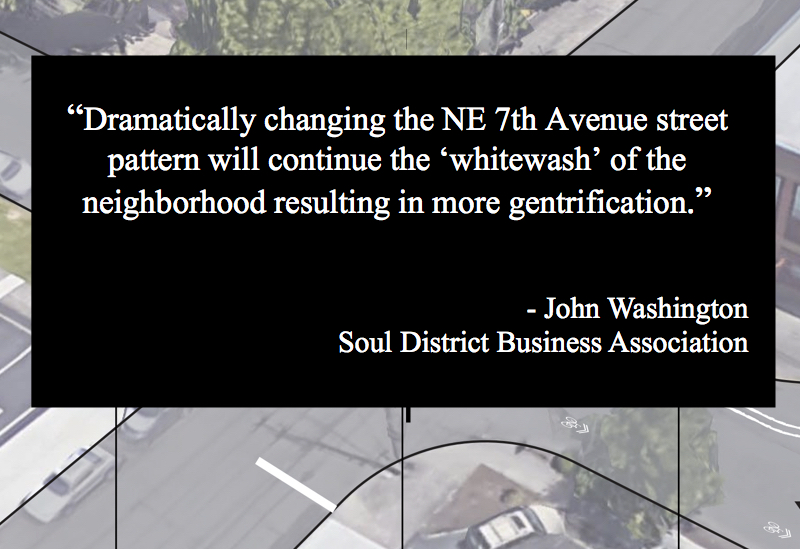
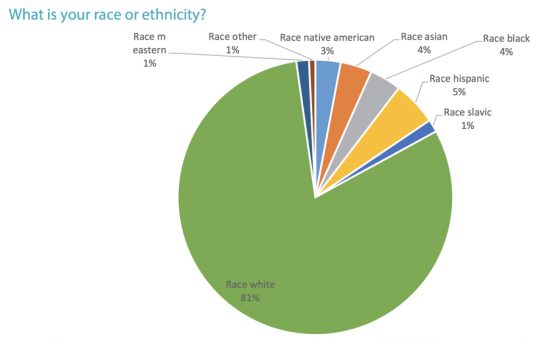

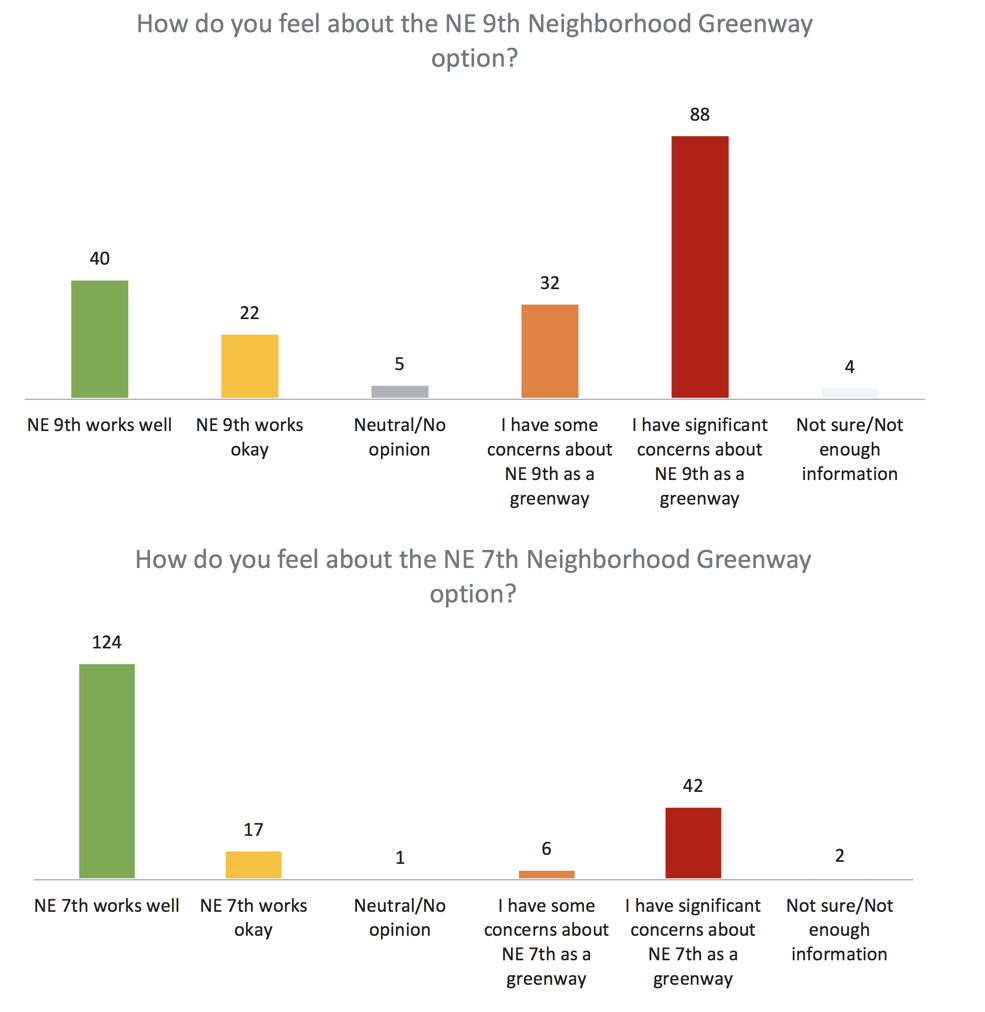
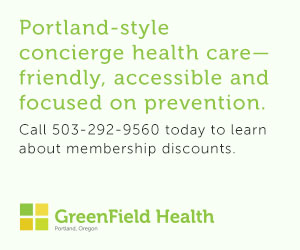
No comments:
Post a Comment